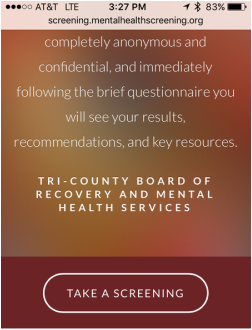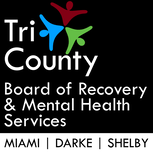 A free, confidential online mental health screening tool can be used on a smartphone or tablet as well as a computer web browser.
A free, confidential online mental health screening tool can be used on a smartphone or tablet as well as a computer web browser. To access the screening tool, go to www.tcbmds.org and choose the Find Help menu, then choose the Take A Screening option. The screening site can also be linked directly at screening.mentalhealthscreening.org/tri-county-ohio.
The screening tool can be accessed from a web browser on a desktop computer, or from a tablet or smartphone. The site automatically resizes and formats appropriately for the type of device.
Screening questionnaires are available for Depression; Generalized Anxiety Disorder; Adolescent Depression; Bipolar Disorder; Alcohol Use Disorder; Posttraumatic Stress Disorder; and Eating Disorder. Persons may take any or all of the screenings, and may take any screening more than once.
Upon completion of the questions, based on answers given, people may receive information for further follow-up, but the site is careful to point out that it should not be considered a diagnosis, and does not substitute for a complete and professional assessment.
"It's a quick checkup," said Brad Reed, Director of Community Resource Development for the Tri-County Board. "It's designed as a self-check for those who may be concerned about their mental wellness, and good way to determine whether a more complete assessment might be warranted."
Results of the screening may be printed or emailed, but in either case, no personal information is kept, either by the Tri-County Board or Screening for Mental Health, Inc. Aggregated statistics, such as the number of screenings in each category taken, or the number who reported they will seek further help, are collected and reported on a weekly, monthly or annual basis.
"We provide links to our behavioral health service provider partner agencies - Recovery and Wellness Centers of Midwest Ohio, Miami County Recovery Council, and Shelby County Counseling Centers," Reed said. "Or people can link to our full list of service providers, and if they happen to be out of the Tri-County service area, there's a link to a national service locator. We want to remove as many barriers as we can for people who want to take the next step."
Reed added that "mental health is very much like physical health, in that conditions change over time. We encourage people to revisit the screening tool at least once a year, or more often if they feel they have experienced a change."
The subscription cost for the survey is "several hundred dollars a year," Reed said, and added that it is made possible because of local support for the mental health levy. "This is definitely a community service we've been wanting to provide locally for some time," Reed said, "and now that we have it, we want people to use it."
 RSS Feed
RSS Feed
